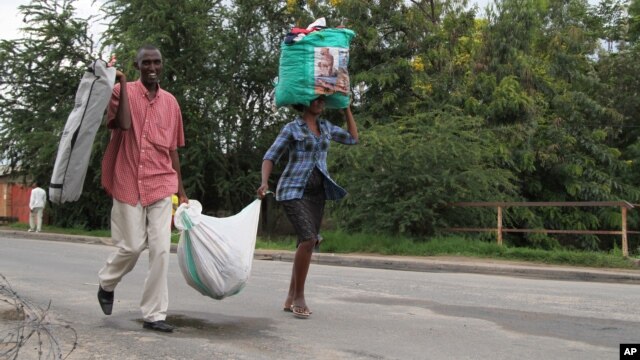
People carry their belongings in Bujumbura, Burundi, Nov. 7, 2015.
UNITED NATIONS—
The U.N. Security Council sent a united message to the fighting parties in Burundi on Thursday to stop the violence and resolve their issues at the negotiating table.
All 15 members voted for a resolution that noted the African Union's recent decision to impose targeted sanctions against those who obstruct peace and fuel violence. The Council said it would “consider additional measures” against such violations - diplomatic code for sanctions such as travel bans and asset freezes.
“This important resolution also sends a message of mobilization to break the cycle of violence which is fueled by hate speech,” said French Ambassador Francois Delattre, whose delegation drafted the text.
He cautioned that the Security Council must do everything in its power to prevent “a country-wide conflagration” in Burundi that could have regional implications. And he appealed to all sides “not [to] let the genie of ethnic violence out of the bottle.”
Violent attacks and clashes have killed at least 240 people since April and sent tens of thousands fleeing inside the country and beyond. President Pierre Nkurunziza's decision to run for re-election four months ago, despite what many Burundians see as an absolute constitutional ban on a third presidential term, has been a major factor in the country's political crisis.
Violence has not declined in the aftermath of the president's election victory, and observers are now concerned about the possibility of another civil war between the country’s ethnic Tutsis and Hutus – similar to the Rwandan genocide of 1994.
British Ambassador Matthew Rycroft, who heads the council this month, told reporters the situation is very serious:
“We know that in the worst case what we are talking about is a possible genocide, and we know that we have to do everything we possibly can to prevent that,” he said.
The British envoy said the United Nations has a range of tools and measures it can employ to quell the violence, including sanctions, political measures and peacekeepers.
One possibility if the situation escalates would be to send U.N. peacekeepers from the neighboring Democratic Republic of Congo to Burundi. U.S. Ambassador Samantha Power said that scenario “has to be examined,” but she acknowledged that the U.N. troops already “have their work cut out for them where they are.”
A peacekeeping official told VOA that the U.N. is looking into a number of options as part of its contingency planning, but that a “regional coalition would be well-placed to provide a rapid and credible response” if the situation worsens.
The African Union Peace and Security Council has requested that its East Africa Standby Forces accelerate contingency planning for a possible deployment to Burundi.
But the international community hopes the situation does not come to that.
Earlier Thursday, the U.N., African Union and European Union called on the Burundian government and opposition to urgently convene a meeting in Addis Ababa or Kampala under the mediation of President Yoweri Museveni of Uganda to seek a political solution to the crisis.
|
|
